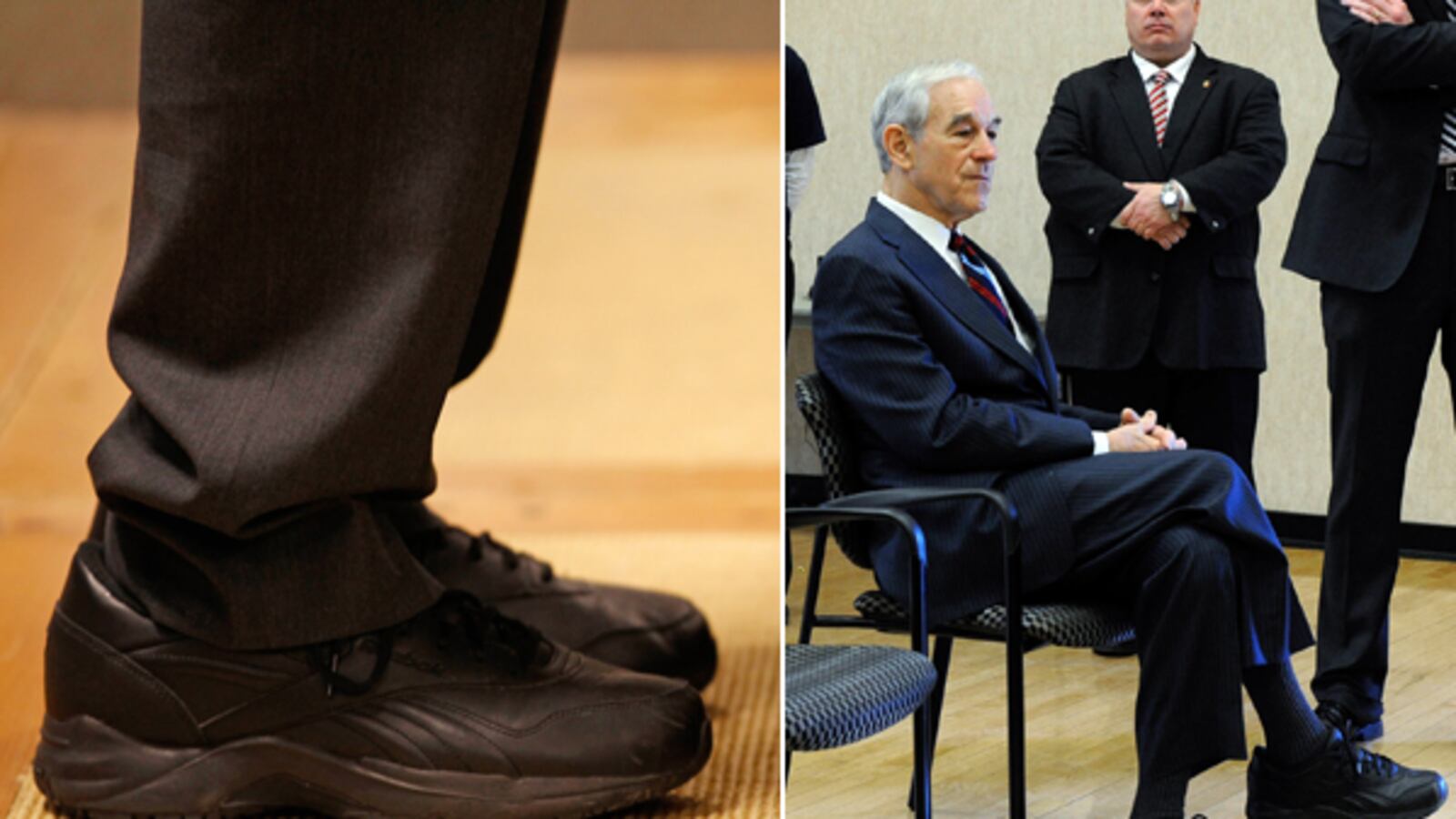On Tuesday the four remaining Republican presidential candidates will fan across 10 states, delivering stump speech after stump speech, reciting their core values, and hurling jabs at one another—not conservative enough, not organized enough; too rich, too pandering.

But despite the hopefuls’ months of hammering away on their speeches, some Americans will cast their vote on Super Tuesday based solely on a candidate’s image. There’s Romney with his slicked-back hair and perfectly tailored suits, Santorum with his overt rolled-up shirt sleeves and Mr. Rogers sweater vests, and Gingrich with his dark suits straining at the buttons.
And then there’s Ron Paul. In lopsided jackets many sizes too big, trousers so baggy they could pass as harem pants, and black orthopedic “referee” sneakers, Paul has distinguished himself during election season as the least sartorial of the bunch. He greeted Iowans last summer in a lime-green golf shirt with thick black stripes, tucked in a short-sleeved madras shirt for a television interview, and donned tan hiking boots with suit pants onstage for the Ames Straw Poll. As The Washington Post’s Chris Cillizza noted in October, Paul’s jacket at the Las Vegas debate was “at least two sizes too big,” which made the candidate “look tiny, never a good image to project when you are running for president.”
Even a post on a forum for Paul’s supporters, Daily Paul, elicited debate. “He should spend a little money and get a fine, fitted suit,” one commenter wrote. “His message will be the same, but he will look far better delivering it. A candidate’s look is very important to some people, and we need all the votes we can get.”
After the 2008 presidential campaign, filled with John McCain’s $520 Ferragamo loafers and John Edwards’s $400 haircuts, candidates have wisened to the perils of appearing too rich (well, maybe with one glaring exception). Outfits are calculated to a T—and, in the cases of Romney and Santorum, jeans and sweaters are paraded like badges of honor before the American working class. But Paul sets himself apart from the pack, noticeably flouting convention when it comes to appropriate dress—and surprisingly, style experts approve.
Paul’s suits look as though they’ve been purchased off the rack at a men’s store, and there’s no evidence of a stylist or tailor on his campaign. According to G. Bruce Boyer, style expert and author of the recent Gary Cooper: Enduring Style, Paul exudes a very “homogenized” look. It’s not, he says, “an Ivy League look, it’s not a British look, it’s not an Italian look. It’s just nothing.”
But what actually contributes to this unique sartorial nothingness? First of all, his jackets are too long. According to Washington tailor William Field, a suit coat should end anywhere between the base of a man’s thumb and the first knuckle. (Several images show that more than one of Paul’s jackets clear his thumb altogether.) Jackets should be flush around the collar of a shirt—but Paul’s lapels hang off his neck, with a large gap between each of his shirts and the neck of the coat.
Recent trends dictate that pants be worn short and without pleats—especially for diminutive men—but Paul practically drowns in his pants, with large puddles of fabric collected at the ankles. “Dr. Paul has one suit that looks like it’s about 15 years old and he’s lost about 25 pounds and he’s wearing it unaltered,” Field says. “The shoulders look too large, the length too long, the trousers too full. The whole thing collapses.”
But for all his missteps, multiple experts consulted by The Daily Beast extolled Paul’s loyalty to his own sense of style. In an election season when candidates are masquerading as average Americans, they say, Paul’s sense of self sets him apart.
“He dresses like a small-town guy, and I think it makes him seem more sincere,” says Glenn O’Brien, the author of How to Be a Man: A Guide to Style and Behavior for the Modern Gentleman. “If someone dresses like they’re looking in the mirror all the time, it does tend to undermine.” O’Brien says he wouldn’t change anything about Paul’s appearance—except, maybe, the cut of his pants.
“Ron Paul is the most honest in his image,” agrees Boyer. “He’s the guy who’s most comfortable in his own skin and his own clothes. He gets up there in his medium-priced, ill-fitting suits and says, ‘This is what I’ve always worn. Take it or leave it.’ And I admire him for that.”
Maybe it’s just this fashionlessness that will make Paul appeal to voters. “We want our presidents to look presidential; like our better selves,” Boyer explains. “But we want them to be democratic rather than royal, and we want them to have a certain dignity.” And for one supporter, Paul’s appearance does just that: “His humanity is what makes him real,” he writes. “I honestly wouldn’t change a thing. I even like his beat up orthopedic shoes.”






